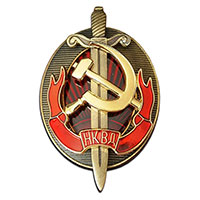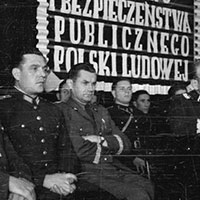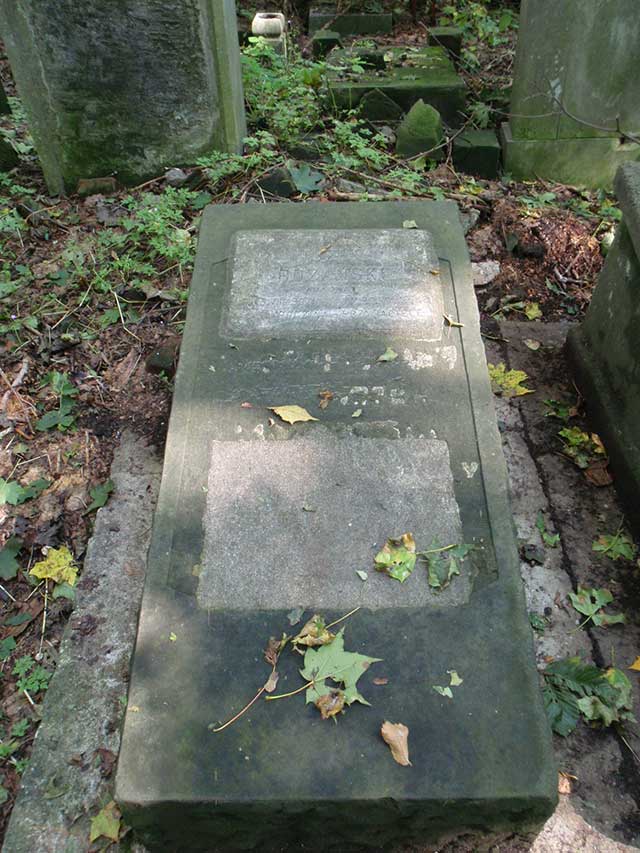Józef Różański / Józef Goldberg
Józef Różański, Jacek Różański, originally Józef Goldberg (1907-1981) - Polish lawyer, NKVD People's Commissariat of Internal Affairs of the USSR (NKVD, russian: Наро́дный комиссариа́т вну́тренних дел) – a central state organ existing under this name in the years 1917–1946. He became a symbol of all crimes committed by the Soviets in the public consciousness. and MBPMinistry of Public Security (MBP) - a ministry introducing internal security, public security, external security obtained by counterintelligence and intelligence, functioning during the formation of the communist dictatorship in the Polish People's Republic on the order and dictation of the Soviet authorities. In addition to the Main Directorate of Information of the Polish Army, responsible for the massive bloody repression of citizens during the Stalinist period. In the field, the Ministry was represented by the Public Security Offices (polish: Urzędy Bezpieczeństwa Publicznego - UBP) subordinate to it, which is why these institutions were colloquially referred to as UB. officer, member of the Legislative Seym, Stalinist criminal, Jewish communist, colonel of UB
People's Commissariat of Internal Affairs of the USSR (NKVD, russian: Наро́дный комиссариа́т вну́тренних дел) – a central state organ existing under this name in the years 1917–1946. He became a symbol of all crimes committed by the Soviets in the public consciousness. and MBPMinistry of Public Security (MBP) - a ministry introducing internal security, public security, external security obtained by counterintelligence and intelligence, functioning during the formation of the communist dictatorship in the Polish People's Republic on the order and dictation of the Soviet authorities. In addition to the Main Directorate of Information of the Polish Army, responsible for the massive bloody repression of citizens during the Stalinist period. In the field, the Ministry was represented by the Public Security Offices (polish: Urzędy Bezpieczeństwa Publicznego - UBP) subordinate to it, which is why these institutions were colloquially referred to as UB. officer, member of the Legislative Seym, Stalinist criminal, Jewish communist, colonel of UB Ministry of Public Security (UB, polish: Urząd Bezpieczeństwa) - secret police, intelligence and counterintelligence agency operating during the communist era of the Polish People's Republic. Identified with communist crimes; murders and bestial torturing of those fighting for independent Poland. in the communist Poland.
Ministry of Public Security (UB, polish: Urząd Bezpieczeństwa) - secret police, intelligence and counterintelligence agency operating during the communist era of the Polish People's Republic. Identified with communist crimes; murders and bestial torturing of those fighting for independent Poland. in the communist Poland.
During the Second World War, he got to the territories occupied by the army of the USSR, where he worked, among others, in the NKVD. He was famous for informing the NKVD on everyone, including his comrades.
On July 1, 1947, he became a colonel [SB] and director of the Investigative Department of the Ministry of Public Security with the rank of captain of the Polish Army. The rapid advancement in the structures of the Ministry of Public Security resulted from the fact that he did not hesitate to follow the orders of Bolesław Bierut and Ivan Sier, towards which he was fully available.
Różański's investigative methods, which boiled down to adjusting the investigative material to the previously developed theses of the accusation, gained gloomy fame. The testimonies were extracted using torture commonly used by Różański. He is known as a ruthless and extremely brutal man. His interviewees said he was a sadist.
Zdzisław Uniszewski in the historical periodical "Karta" wrote:
It is absolutely indisputable that Różański himself was beating to the blood, tolerated the beatings and incited his subordinate officers to him, beating them in their presence. His essential "professional" skill was to mentally torment people in the investigation and to obtain information from them, often false, that they would not have given before, even during torture in the Gestapo torture rooms.
Hundreds of people interviewed by Różański or his subordinates lost their lives or became disabled. His behavior and mentality are well characterized by the case of Emilia Malessa "Marcysia". She was arrested in the fall of 1945. Różański gave her "a word of honor", he will not hurt the people he wants to capture, but if she does not help him, blood will be shed. Malessa was persuaded and betrayed many Home Army soldiers. They were subjected to a brutal investigation. Malessa, when she was released under a pardon, began calling Różański to keep his word of honor and to free all detainees as a result of her testimony. These attempts were unsuccessful. Unable to live with the knowledge of betrayal, Malessa committed suicide. Różański is also responsible for the arrest of the president of the Second Main Directorate WiNFreedom and Independence (pl. Wolność i Niezawisłość) - Polish civil-military underground organization founded in 1945 in Warsaw. Its core were the remains of the disbanded Delegation of the Armed Forces for Poland. WiN took over its organizational structure, staff, property, and partly forest departments. The commanders of the Delegation of the Armed Forces areas became the presidents of the WiN areas. WiN demanded that the Red Army and the NKVD leave Poland. The organization rejected the shape of the eastern border established in Yalta. The organization was also against political persecution and the devastation of the country committed by the Soviet army., Col. Franciszek Niepokólczycki, who was then sentenced to death (the sentence was not carried out). He also supervised the investigation of [Witold Pilecki] and is the actual perpetrator of his death penalty.
He was the manager of the so-called a special group to investigate the "provocateurs" within their own party. Różański embraced his ideological colleagues, whom it was decided to eliminate with his "investigative methods" (torture). For example, members of the Polish United Workers' Party - H. Siedlik and E. Piwińska accused Różański of using torture. The complaint contained a description of the methods used in the investigation. Its authors accused Różański of being a pervert and a sadist.
When Józef Światły fled abroad and began to expose the methods of the MBP in Radio Free Europe in order to save his face, the PRL authorities decided to "punish" those responsible for "criminal practices". Różański became the scapegoat. The trial against Różański was supervised and held behind closed doors. It was only proved that he personally used methods prohibited by law in the course of investigations against persons suspected of anti-state activities, he was directly involved in beating the interrogated and using other unlawful means. It was also found that his conduct had demoralized his subordinate investigators, who saw him as a role model. During the trial, Różański's responsibility for the arrest and torture of members of the independence underground was completely ignored.
In 1956 an investigation against him was resumed, but it was combined with an investigation against two other employees of the Ministry of Public Security accused of using "inhumane methods" in their investigative work - Anatol Fejgin and Roman Romkowski . During the trial, he was limited to accusing him of using "illegal acts" against several dozen members of [the Polish United Workers' Party]. Again, the brutal persecution of members of the Polish independence underground and Różański's connections with the Soviet security organs was completely ignored.
He left the service in the MBP, decorated with the Order of the "Cross of Grunwald" III and II class, the Officer's and Knight's Cross of the Order of Polonia Restituta, as well as the Gold Cross of Merit.
The defendant appealed against the verdict, appealing to the Supreme Court. The court rejected the defense lawyer's request, stating:
The court concluded that the imprisonment, although long, did not bring about the desired changes in his psyche. To this day, the convict has not understood and does not want to fully understand what his guilt and the enormous social damage caused by his actions consisted of. Until now, the convict is not yet able to definitively condemn his anti-humanitarian methods against people.
Despite this, in 1964 the State Council applied the law of grace. Along with Różański, other Stalinist torturers, including Romkowski and Fejgin, were released.
After his release, Różański had no major problems with finding a job. He became an official at the State Mint in Warsaw until his retirement. He died in 1981 as a result of a cancer disease. He has never shown remorse for the crimes committed.

https://pl.wikipedia.org/wiki/J%C3%B3zef_R%C3%B3%C5%BCa%C5%84ski